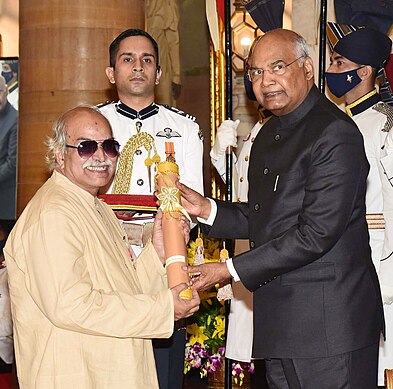

Harish Chandra Verma
| |
|---|---|

Verma during a lecture in 2019
| |
| Born | (1952-04-03) 3 April 1952 (age 72) |
| Alma mater |
|
| Known for | Concepts of Physics textbook |
| Awards |
|
| Scientific career | |
| Fields | Nuclear physics |
| Thesis | Studies Of The Electric Field Gradients in Non-cubic Metals Using 57^Fe Mössbauer Spectroscopy (1980) |
| Doctoral advisor | Prof. G. N. Rao (IIT Kharagpur) |
| Website | hcverma |
Harish Chandra Verma (born 3 April 1952), popularly known as HCV, is an Indian experimental physicist, author and emeritus professor of the Indian Institute of Technology Kanpur. In 2021, he was awarded the Padma Shri, the fourth highest civilian award, by the Government of India for his contribution to Physics Education.[1] His field of research is nuclear physics.[2]
He has authored several schools, undergraduate and graduate level textbooks, including but not limited to the most popular and most notably the two-volume Concepts of Physics, extensively used by students appearing for various high-level competitive examinations.[3][4]
He has co-founded Shiksha Sopan, a social upliftment organization for economically weaker children living near the campus of IIT Kanpur.[3][5] He has dedicated himself in training young minds in the field of Physics. He has immensely contributed to popularising Physics education among Indian students and teachers by conducting lectures and experimental demonstrations.
He has been awarded the Maulana Abul Kalam Azad Shiksha Puruskar by the Bihar state government.[3][6]
Verma was born on 3rd April, 1952 to Ganesh Prasad Verma, a teacher and Ramvati Verma in Darbhanga, Bihar. He obtained his B.Sc. degree at the Patna Science College. Then he obtained M.Sc. and Ph.D. at the IIT Kanpur.[3][4]
In early 1980, Verma joined Patna Science College as a lecturer.[3] He remained at the college as a lecturer and reader for 15 years[6] before resigning from the college and joining IIT Kanpur.
Verma joined IIT Kanpur in 1994 as an assistant professor. Here he pursued research in experimental nuclear physics. He has published 139 research papers.[7] He retired on 30 June 2017.[8]

Verma has developed more than six hundred ‘low cost’ physics experiments that teachers can employ in their classrooms. In 2011, he set up the National Anveshika Network of India (NANI), a flagship program of the Indian Association of Physics Teachers (IAPT). He is the national coordinator for this program. There are currently 22 Anveshikas in the country.[3][4]